|
|
|
Sort Order |
|
|
|
Items / Page
|
|
|
|
|
|
|
| Srl | Item |
| 1 |
ID:
189709
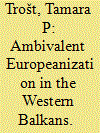

|
|
|
|
|
| Summary/Abstract |
The drawn-out process of applying for European Union membership has encouraged cynicism in Serbia and other Western Balkan states about the value of becoming part of the bloc. Local elites have instrumentalized the accession process, making a show of superficial compliance with EU conditions while eroding democratic institutions and stoking popular backlashes against EU-mandated protections for minorities. Perceptions that Brussels has turned a blind eye to such behavior have weakened the pro-European camp in the region.
|
|
|
|
|
|
|
|
|
|
|
|
|
|
|
|
| 2 |
ID:
153968
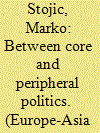

|
|
|
|
|
| Summary/Abstract |
This article seeks to determine whether parties’ governmental/opposition and core/peripheral positions in the Serbian and Croatian party systems are related to their responses to European integration. In general, parties’ positions in the party system were not crucial driving forces behind their stances towards the EU. However, the experience of opposition significantly contributed to ideological transformation and the adoption of a Euro-enthusiastic agenda by strategically motivated, formerly Eurosceptic parties. Also, different types of party systems in Serbia and Croatia created different opportunities for parties to express Eurosceptic sentiments, with a fragmented and polarised system in Serbia being more conducive to the sharp contestation of EU issues.
|
|
|
|
|
|
|
|
|
|
|
|
|
|
|
|
| 3 |
ID:
158456
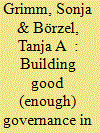

|
|
|
|
|
| Summary/Abstract |
In this essay, we assess how the European Union supports the development of postconflict Western Balkan societies toward stable peace, economic prosperity, and consolidated democracy, moving them along the path to Denmark. Our analysis reveals that the EU has contributed to effective and democratic governance in its southeastern neighborhood. At the same time, its effectiveness as an external good governance–builder varies. Structural postconflict conditions that are not conducive to democratization, conflicting policy objectives, the dynamic interplay between the EU and Western Balkan governments, and the involvement of domestic third-party actors in the reform process explain this variation. To make EU good governance–building more effective, we recommend acknowledging conflicting objectives and using governance-building instruments consistently and credibly to reconceptualize external good governance–building as a dynamic process between external and domestic actors and to take domestic actors and their preferences seriously.
|
|
|
|
|
|
|
|
|
|
|
|
|
|
|
|
| 4 |
ID:
108278
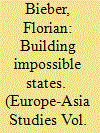

|
|
|
| 5 |
ID:
118001
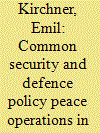

|
|
|
|
|
| Publication |
2013.
|
| Summary/Abstract |
Common Security and Defence Policy (CSDP) missions have increased substantially in number, functions and geographic spread since their inception in 2003. Despite their expansion in numbers and scope, especially in the Western Balkans, few systematic assessments of the contributions that CSDP missions make to peacekeeping and peacebuilding efforts have been undertaken to date. This article addresses that lacuna by assessing the contributions CSDP missions have made in recent years to peacekeeping and peacebuilding in the Western Balkans. It explores whether CSDP missions in that region: make an intrinsic contribution to peacekeeping and peacebuilding in those countries or merely profit (or take credit) from the initial groundwork laid by United Nations (UN) and North Atlantic Treaty Organization (NATO) missions; are adequately coordinated within the European Union (EU) and between the EU and other international organisations, including NATO; are sufficiently embedded or effectively linked to other EU instruments, such as the Stability and Association Process to the Western Balkans; and engender adequate elite or public support or 'ownership' in these countries.
|
|
|
|
|
|
|
|
|
|
|
|
|
|
|
|
| 6 |
ID:
108284
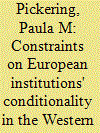

|
|
|
| 7 |
ID:
086034
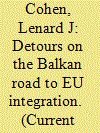

|
|
|
|
|
| Publication |
2009.
|
| Summary/Abstract |
"Throughout the western Balkans, formidable challenges to economic reform and democratic consolidation threaten to reawaken old problems and reinforce negative tendencies."
|
|
|
|
|
|
|
|
|
|
|
|
|
|
|
|
| 8 |
ID:
098464


|
|
|
|
|
| Publication |
2010.
|
| Summary/Abstract |
This article examines how external third parties, particularly international organizations, can facilitate the development of security community and international integration within post-conflict societies. Focusing on seven countries in the Western Balkan region, this study offers unique insight into how and why feelings of trust and a sense of community can be encouraged by external actors - the EU and NATO in this case - and how and if trust and community can filter down to the most local levels within post-conflict societies. Ultimately, we argue that both the EU and NATO have, primarily through membership requirements to engage in regional interaction and cooperation, significantly contributed to the development of security community among Western Balkan neighbors at the elite level. However, we also find that feelings of trust and belongingness are still very much lacking among the general population of the Western Balkan region. Such insights will further efforts to enhance conflict resolution and post-conflict reconstruction in the Western Balkans and elsewhere.
|
|
|
|
|
|
|
|
|
|
|
|
|
|
|
|
| 9 |
ID:
118283
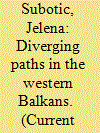

|
|
|
|
|
| Publication |
2013.
|
| Summary/Abstract |
Croatia has bought its ticket to Brussels, and Montenegro could be next, while Serbia, Bosnia, Macedonia, and Kosovo are stuck in a crowded, smoky waiting room.
|
|
|
|
|
|
|
|
|
|
|
|
|
|
|
|
| 10 |
ID:
065203
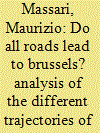

|
|
|
| 11 |
ID:
114742
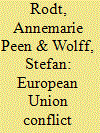

|
|
|
|
|
| Publication |
2012.
|
| Summary/Abstract |
Following a brief overview of the European Union's (EU) conflict management 'history', this article discusses the evolution of EU capabilities throughout the Union's involvement in the Western Balkans since the early 1990s. This is followed by a detailed case study of the EU intervention in Macedonia - Operation Concordia - and the contextual factors of that conflict, which shaped the outcomes of the EU's military efforts there. We conclude from this that the EU, alongside its partners in and beyond Macedonia, successfully prevented a likely civil war in the country in 2001, because the Union had a clearly defined set of interests, shared across institutions and member states, and interests that matched those of the main political players in Macedonia. This translated into sufficient political will to deploy sufficient military capabilities suited to the context of conflict management in Macedonia. However, we remain cautious as to whether the Union can muster similar levels of political will as well as the necessary capabilities to achieve the same elsewhere in the world.
|
|
|
|
|
|
|
|
|
|
|
|
|
|
|
|
| 12 |
ID:
141559
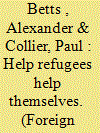

|
|
|
|
|
| Summary/Abstract |
There are now some 60 million displaced people around the world, more than at any time since World War II. The Syrian crisis alone, which has created the largest refugee shock of the era, has displaced some ten million people, around four million of them across international borders. In recent months, Western attention has focused almost exclusively on the flood of these refugees to Europe. Yet most of the Syrian refugees have been taken in not by Western countries but by Syria’s neighboring states: Jordan, Lebanon, and Turkey, whose capacity has been overwhelmed. Lebanon, with a population of around four million and a territory smaller than Maryland, is hosting over a million Syrian refugees. Young people are overrepresented in the refugee population, so that more than half of the school-aged children in Lebanon are now Syrian.
|
|
|
|
|
|
|
|
|
|
|
|
|
|
|
|
| 13 |
ID:
157980
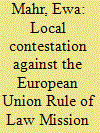

|
|
|
|
|
| Summary/Abstract |
This article examines local contestation against the European Union Rule of Law Mission in Kosovo (EULEX), manifesting itself in local actors publicly demanding a change in the mission’s mandate and/or its operations. The article investigates how EULEX’s actions and its effectiveness are perceived and reacted upon by the local actors. It shows that local contestation is mainly fueled by (1) conflicting sovereignty claims by the majority Albanians and the minority Serbs; (2) the understanding of sovereignty by parts of society as entailing exclusive authority; and (3) dissatisfaction with the mission’s effectiveness. By addressing EULEX from a bottom-up perspective—that of the local actors—the article underlines the limitations of EU policies in post-conflict Kosovo.
|
|
|
|
|
|
|
|
|
|
|
|
|
|
|
|
| 14 |
ID:
159779
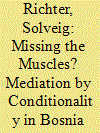

|
|
|
|
|
| Summary/Abstract |
In October 2009, the European Union, in conjunction with the United States, launched a high-level mediation effort in Butmir, Bosnia and Herzegovina, to reform the political structure of the state. Since 2005, the constitution which was included in the Dayton Peace Accord has been widely perceived as dysfunctional. In two negotiation rounds, the EU and the US put a comprehensive proposal on the table and showed strong leverage. However, the talks ended without a tangible result. To explain this failure, a theoretical model is developed based on both mediation and Europeanization literature to explore mediation by conditionality as a type of ‘directive mediation’ in a systematic way. Contrary to the argument that the EU lacked muscle, it is argued that pre-conditions for political conditionality were not fulfilled and strong leverage proved ineffective and counterproductive. These results question conditionality as an effective mediation strategy when state-building is contested between local parties.
|
|
|
|
|
|
|
|
|
|
|
|
|
|
|
|
| 15 |
ID:
132513
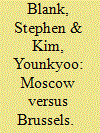

|
|
|
|
|
| Publication |
2014.
|
| Summary/Abstract |
Many see the western Balkans as the back yard of Europe. As the promise and reality of regional economic integration has weakened, however, Russia has returned to the area to play its historically important regional role. In the Balkans, a Russian or Russifying project competes against a European Union project, while Washington has shown little interest in the Balkans during the Barack Obama administration. The instruments of this rivalry are not only, or even primarily, armies but rather economic-political forces: control of energy pipelines and production, the use of that control for political objectives, and the attraction of competing political models.
|
|
|
|
|
|
|
|
|
|
|
|
|
|
|
|
| 16 |
ID:
187057
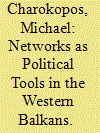

|
|
|
|
|
| Summary/Abstract |
The article explores how transport networks in the Western Balkans are transformed from physical infrastructures into political instruments. It concentrates on two case studies: the construction of the ‘Brotherhood and Unity’ Highway and the EU connectivity agenda in the Western Balkans. It examines how the first was part of the process of constructing a Yugoslav ‘community of nations’ and how the latter has been integrated into the broader scheme of ‘region building’ in the Western Balkans. The analysis considers how transport networks were used in each case and reflects on the limits and the durability of this political endeavour.
|
|
|
|
|
|
|
|
|
|
|
|
|
|
|
|
| 17 |
ID:
065202
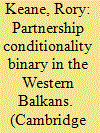

|
|
|
| 18 |
ID:
171161


|
|
|
|
|
| Summary/Abstract |
The article provides a critical overview of the rise of resilience at the European Union (EU) level and to what extent its adoption is reshaping the terms of the EU’s peacebuilding interventions. It argues that resilience offers a four-fold contribution to promoting sustainable peace: (1) a focus on complexity; (2) a systems approach; (3) a shift toward local capacities; and (4) an emphasis on human agency. The article then applies this framework to assess the implementation of the EU’s “resilience turn” since the adoption of the EU Global Strategy in 2016. Focusing on the EU’s discourse and its peacebuilding practices in the Western Balkans, the evidence suggests that the EU has only embraced a systems/integrated approach, while neglecting deeper understandings of complexity, local capacities and human agency. As a result, the contribution of resilience to EU peacebuilding remains limited.
|
|
|
|
|
|
|
|
|
|
|
|
|
|
|
|
| 19 |
ID:
108782
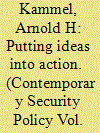

|
|
|
|
|
| Publication |
2011.
|
| Summary/Abstract |
Since the early days of the Common Foreign and Security Policy and the European Security and Defence Policy, the EU has always paid special attention to developments in the Western Balkans and therefore declared them a strategic priority for European external action. Thus, it is not surprising that the first missions in the framework of ESDP were deployed to this region. Considering the deployment of civilian crisis management missions to the Western Balkans a first step in the shaping of a strategic culture and based on the assumption that the European Union clearly possesses the prerequisites to form such a strategic culture, the following chapter will analyse the development of civilian crisis management and chronologically describe and evaluate the four civilian missions carried out in the Western Balkans. The conclusion is that despite the fact that ESDP is still a work in progress, the engagement in civilian crisis management missions already provides a marker for the existence of an emerging European strategic culture in the process of formation.
|
|
|
|
|
|
|
|
|
|
|
|
|
|
|
|
| 20 |
ID:
115474
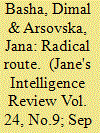

|
|
|
|
|
|
|
|